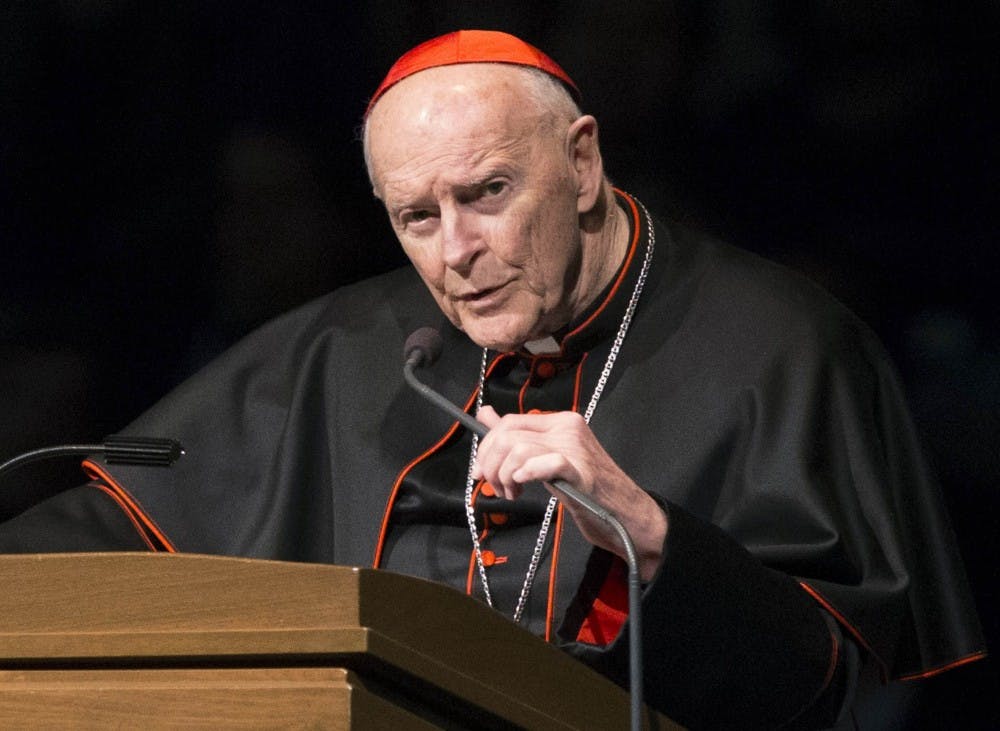Last summer, amidst allegations of sex abuse within the Catholic Church, UP rescinded ex-Cardinal Theodore McCarrick’s honorary degree from 2008. This past weekend, UP’s decision was validated by McCarrick’s expulsion from the priesthood after the Church found him guilty of sexual crimes against adults and minors, and abuse of power.
While Notre Dame and Georgetown waited until now to rescind McCarrick’s honorary degrees, UP was among a handful of institutions that made that decision this past July. University president, Fr. Mark Poorman, said that the decision in July was informed by the credibility of the Archdiocese of New York review board’s findings regarding McCarrick as well as his following resignation from the College of Cardinals.
“University administration, in consultation with the leadership of the University’s Board of Regents, considered the nature of the allegations against McCarrick and the impact on our campus community of his continued possession of an honorary designation,” Poorman said in an email. “The decision to rescind McCarrick’s honorary degree reflects our commitment as a community to promote a world free from all forms of sexual abuse, misconduct and violence.”
McCarrick’s removal from the priesthood marks the first time in history that a cardinal — a member of the group of bishops that elect the pope — has received this punishment due to sexual abuse. The Vatican’s statement issued Feb. 16 said it found McCarrick guilty of soliciting sexual acts and breaking the Sixth Commandment — referring to the biblical law against adultery — with minors and with adults, “with the aggravating factor of the abuse of power.”
McCarrick’s expulsion from the priesthood means that he is no longer authorized to preside at Catholic sacraments such as Mass or Confession, with the exception that he’s still required to hear confessions in cases where someone is in danger of death.
David Turnbloom, assistant professor of theology, said there’s often confusion around what it means to be defrocked, however.
“Someone who is removed from pastoral office no longer enjoys the rights and privileges of that office,” Turnbloom said. “However, McCarrick is still a cleric. Hence it is a misnomer to call this process ‘laicization.’ McCarrick is not a lay person, because being a lay person is not a punishment or a lower class. Once a person has been validly ordained, they are always a cleric. Therefore, he is still required to keep his vow of celibacy.”
While it might appear that this action against McCarrick points toward the Church being more active in addressing the problem of sexual abuse, Turnbloom said he personally thinks the move shouldn’t be sensationalized.
“Punishing powerful men who are guilty of abuse is not a great act of virtue, nor does it require a great deal of bravery from the Pope,” Turnbloom said. “This event is an example of basic decency. The significant event will be when these powerful men begin to let go of their autocratic power and their claims to moral authority. That form of leadership would take real bravery. Embracing true vulnerability and true cooperation with non-clerics would be an event worth praising.”
This development comes after a long string of recent revelations of sex abuse within the Catholic Church, which began with last August’s Pennsylvania Grand Jury report. Named in that report was former UP president Br. Raphael Wilson. And then last September, a former UP chaplain was named in an Indiana report accusing 18 priests of sexual abusing minors.
Over the next few days, the Pope is leading a Vatican summit on the widespread sexual abuse, an unprecedented gathering where almost 200 Catholic Church leaders are hearing from the survivors of abuse by clergy.
As the Church continues to confront the reality of widespread sex abuse and the suffering of abused victims, Turnbloom worries that the removal of McCarrick turns the attention away from what he sees as the root of the problem: clericalism.
“Clerics sacrificing one another from places of absolute power is still clericalism,” Turnbloom said. “So, I would encourage anyone invested in fighting against injustice in the Catholic Church to stay focused on recognizing and criticizing clerical power in all of its abusive forms.”
Wes Cruse is a reporter for The Beacon. He can be reached at cruse20@up.edu.








